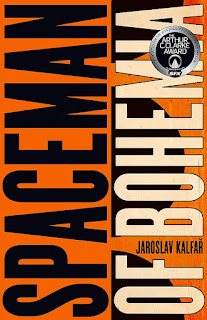Spaceman of Bohemia - Jaroslav Kalfař
In the spring of 2018, Czech astronaut Jakub Procházka sets off on a solo flight on the space shuttle JanHus1. He's on a manned mission to investigate the properties of the dust cloud of a new asteroid called Chopra that has just entered the galaxy. It could pose a threat to humanity, but it could also help understand the origins of the universe. None of the major powers however have been able to commit the resources towards a risky expedition, but the Czech government recognise that they can make a name for themselves here as a world space power. It's also been a lifetime ambition for Jakub Procházka, but the length of the mission and the high possibility that he might never return have put a strain on his marriage to Lenka.
The clue to the real subject of The Spaceman of Bohemia is there in the date chosen for the near future setting of the story. The spring of 2018 is exactly 50 years after the Prague Spring of 1968. What Jakub brings with him on his solo space mission is not just a direction for the future of the Czech Republic, but the past of Bohemia goes with him as well. Jaroslav Kalfař's novel is a look forward to a country attempting to assert its own sovereignty and identity free from the influence of the USA and Russia. To look forward however it first has to confront its past, and that remains a sticking point with Jakub, who father was a high-ranking official of the Communist regime that was responsible for so much terror while he was a child.
There are frequent looks back to Jakub's troubled past, much of it inspired by concern about his mysteriously silent wife and by thoughts provoked by a Nutella loving alien spider creature that has emerged from with ships hold (or his mind). The novel becomes more of an examination and contemplation of life; on an intimate and personal level, as well as on the part the individual plays in the definition of a nation, as well as what a nation really is - particularly one with as complex a history as the former Czechoslovakia. It's also about what makes us human, and it's only when confronted by infinity and death that Jakub starts to grasp what has been important in his life and what its purpose is. "How unlikely! Yet here we are".
You won't be surprised to discover that it is love which is important, but you will be surprised at how Jakub comes to those conclusions in the beautifully observed details that he reflects upon. Jaroslav Kalfař doesn't settle for any easy platitudes, and the reality of what it means to love is handled with a lot more sensitivity and originality. The question of family becomes more and more important in the determination of who we are, and until we know who we are we can't truly love. Love makes us ourselves.
If I make the novel's conclusions sound neat and tie it up into something that sounds easily categorisable, it's actually doing an injustice to the unpredictability of how Jaroslav Kalfař gets there. Spaceman of Bohemia is constantly surprising and going to places you cannot imagine, with all kinds of historical and cultural references; it really is something of a Space Odyssey, with Lenka Jakub's Penelope. There's something of the novelist-philosopher in the writing, in the use of anecdotal history and revisiting of history that brings Milan Kundera to mind, before Kundera's works turned more and more essayist in form. The blending of SF and history however serves to create an alternate reality, which is not quite the same as 'alternate facts', and through them Spaceman of Bohemia manages to brilliantly touch upon a greater truth than the bare reality.




Comments
Post a Comment